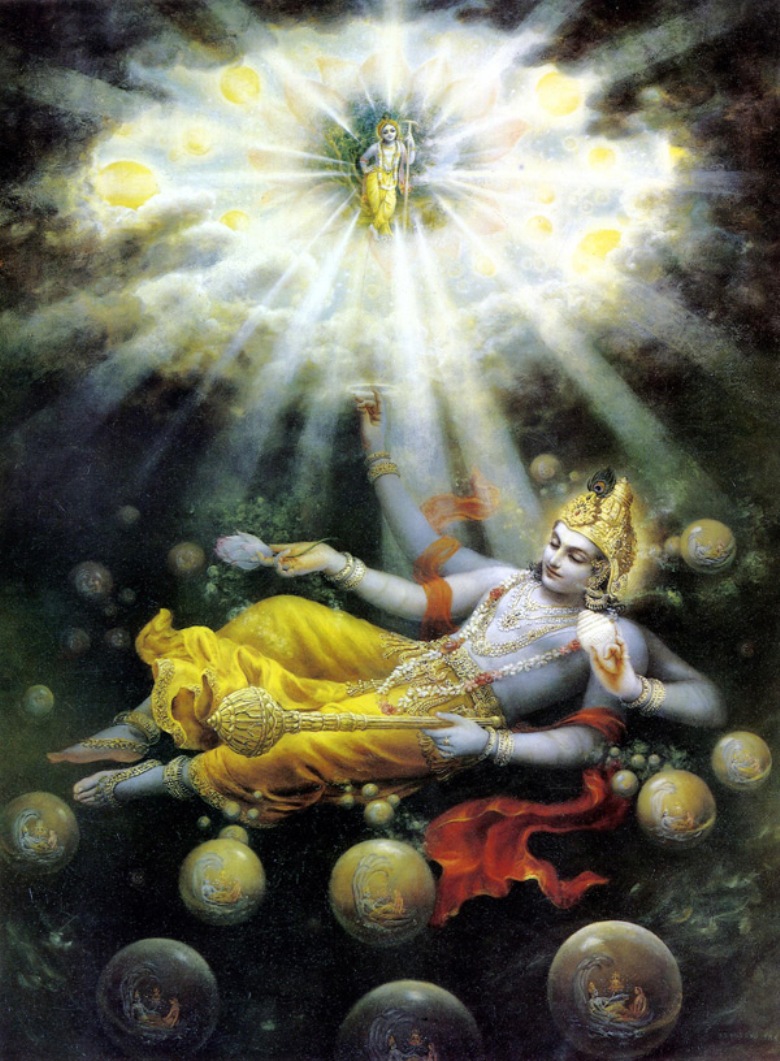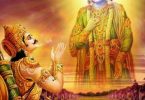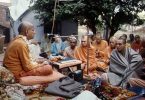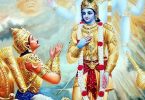Question 1: Those who merge into Brahman do not lose their identity; will they have a particular type of body, or will they remain there without a body?
Answer by Romapada Swami:
Identity of each soul is not to be understood in relation to the body. True identity has everything to do with a spirit soul’s relation with the Supreme Lord Krsna. The soul’s identity is spiritual, eternal and always remains individual. Souls remain as a spirit soul, without the coverings of the soul, within the brahmajyoti.
Question 2: We hear somehow by the grace of the Lord or His devotee, they become a devotee. On what basis that mercy is given to that atma? If it is through the association of devotees, does that devotee travel to Brahmajyoti? Even if he does, how will the merged atma who may not have a body be identified? And again, same question – on what basis this particular merged atma becomes eligible to receive the mercy of devotee association?
Answer by Romapada Swami:
Krishna is equal to everyone (samo ‘ham sarva bhutesu) – just like a cloud which pours water all over, regardless of whether it is rock or land or sea. In turn, a fertile land becomes nourished, whereas some other places remain barren. The difference is due to the quality or capacity of the receptacle. In the same way, those who keep their heart fertile by cultivating proper submission, service attitude etc. are able to receive mercy of the Lord. The mercy of the Lord is available through the mercy of a pure devotee.
When one appreciates and recognizes the mercy that one is receiving, that person is building their bhakti sukriti and that sukriti later transforms into faith, which further develops more through the process of chanting the Holy Name (maha mantra), reading and study of the Vedic scriptures mainly Bhagavad Gita and Srimad Bhagavatam, hearing about the Lord pastimes, serving the Lord and His devotees. Engaging oneself favorably in the mentioned activities, one’s faith will gradually get more deepened and will transform into bhakti.
One very important point to note is that the soul never merges with the Supreme Lord’s effulgence (Brahmajyoti) such that the soul loses its identity and becomes one with Supreme Brahman, because of the merging. The soul always retains its individuality.
Even in Brahmajyoti, there may be occasional visits of pure devotees. Brhat Bhavatamrta, e.g. starting with 2.3.78 gives examples. This section responds to your question.
However, again the onus is on the individual soul to execute its free will (desire) to surrender to the personal form of the Supreme Lord Krsna and engage in rendering devotional service to Him.
Question 3: If they have to come down to this material world, when will that be and on what basis because they have already exhausted their karma, that is why they were blessed to merge? If they have come down again what will define their birth?
Answer by Romapada Swami:
In the part of the purport to SB 4.9.29, Srila Prabhupada writes, “ Here in this verse the Lord is described as mukti-pati, which means “one under whose lotus feet there are all kinds of mukti.” There are five kinds of mukti — sāyujya, sārūpya, sālokya, sāmīpya and sārṣṭi. Out of these five muktis, which can be achieved by any person engaged in devotional service to the Lord, the one which is known as sāyujya is generally demanded by Māyāvādī philosophers; they demand to become one with the impersonal Brahman effulgence of the Lord. In the opinion of many scholars, this sāyujya-mukti, although counted among the five kinds of mukti, is not actually mukti because from sāyujya-mukti one may again fall down to this material world. This information we have from Śrīmad-Bhāgavatam (10.2.32), wherein it is said, patanty adhaḥ, which means “they again fall down.” The monist philosopher, after executing severe austerity, merges into the impersonal effulgence of the Lord, but the living entity always wants reciprocation in loving affairs. Therefore, although the monist philosopher is elevated to the status of being one with the effulgence of the Lord, because there is no facility for associating with the Lord and rendering service unto Him, he again falls into this material world, and his service propensity is satisfied by materialistic welfare activities like humanitarianism, altruism and philanthropy. There are many instances of such fall downs, even for great sannyāsīs in the Māyāvāda school.
Therefore, Vaiṣṇava philosophers do not accept sāyujya-mukti to be within the category of mukti. According to them, mukti means transferal to the loving service of the Lord from one’s position of serving māyā. Lord Caitanya also says in this connection that the constitutional position of a living entity is to render service to the Lord. That is real mukti. When one is situated in his original position, giving up artificial positions, he is called mukta, or liberated. In the Bhagavad-gītā this is confirmed: anyone who engages in rendering transcendental loving service to the Lord is considered to be mukta, or brahma-bhūta. It is said in Bhagavad-gītā that a devotee is considered to be on the brahma-bhūta platform when he has no material contamination. In the Padma Purāṇa this is also confirmed: mukti means engagement in the service of the Lord.
Question 4: When they come down to this material world, will they start from where they left, or it must be from scratch?
Answer by Romapada Swami:
As mentioned above in answer to question 3, within the quoted purport, usually the service propensity of those situated in Brahman is satisfied by taking birth as a human being, and being engaged in materialistic welfare activities like humanitarianism, altruism and philanthropy







